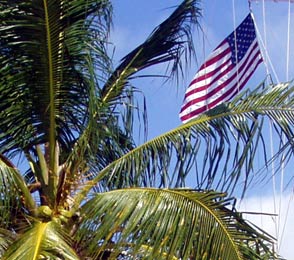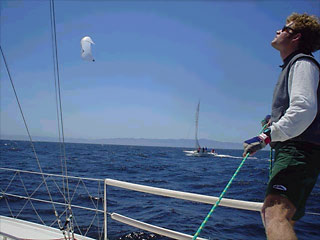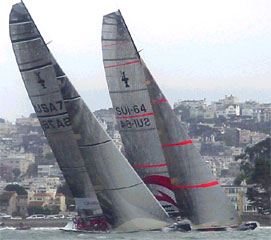CI: Now you will be with a team flying the Swiss flag from the transom with an international crew. As we move to what is sometimes compared to a Formula One format, whatís your opinion of nationalism and the Cup? Peter Holmberg: Good question. Itís a big issue for a lot of people. Letís start with: What was going on before was not working! Bad for the sport, I think, and just driving up the cost. You had this gray fuzzy rule that the defender kept complicated to drive up the costs to challengers and forced us all to keep homes in some country. We were all jumping borders. Thatís now the world of sports . Now, mind you, Iím a very nationalistic person as well. I think one of the proudest moments in my life, ever, was carrying our Virgin Islands flag in the Olympics. So for me, the Olympics is the nationalistic area of our sport that should remain pure and true. The Americaís Cup, all of us can decide, it can be one or the other, but shouldnít be something murky in between. So it could be completely true, you must build your boats and everybody must be a born-and-bred American, etc., or you can open it up. Whatís the rest of the world doing? What are basketball, football, soccer doing? I think itís internationalized and thatís the way it should be. So Iím very happy with what theyíve done. I think itís going to be better for the Cup because before it was gray and fuzzy, and now this is what it is: clean, no unnecessary costs that hurt our sport, driving up the cost of these campaigns. No ambiguity about where you are living, do you have toothbrushes in that primary residence? If you canít do it pure, donít try it. CI: A couple of minutes ago you referred to the Z-86 super-maxis racing in Antigua, Morning Glory and Pyewacket. Do you think the rule should be opened up in future America's Cups to include things like canting keels and so on? PH: Tricky one. I guess Iím just going to have to give you my own opinion. Itís a tough one facing our sport. You know you want to keep it modern, exciting, and at the cutting edge of our sport, yet you canít drive up costs, and obviously that was a concern. I wasnít involved with the teams when that was decided, but thatís a tough one to tackle. I believe thereís a good argument for evolving the class and bringing on some of the modern technology versus keeping it as-is to reduce the cost of development that some of these other teams might have to do. So theyíve chosen to keep it minor modifications from the past, and itís still going to be phenomenal. Take the Star class, for example. Right now itís viewed as one of the hottest classes around, you know. The boat is a hundred-year-old design, but itís being refined in the science of the sails, the techniques, etc. So, I think itís OK. Youíll have a ton of armchair critics saying they should be racing cats. Nah, thatís not the essence of it all. I think youíre going to have great technology being pushed to the limits. Weíll still be able to break new ground and Iím happy with their decision. CI: We know you tested some special kites at Oracle last time. Do you expect any radical design departures where people bang the corners, or refinements of the 2003 vintage?
PH: I believe there will be just refinements. Obviously everyone will be looking outside the box as well, and if you can find, if you can take a major step, obviously you take Ďem. Last time around we didnít see any. I guess Team New Zealand tried the big step but it didnít fly well for them. Everyone is going to shoot for it. There will be refinements, of course. The new location of the event, the venue, is going to open things up a little bit and there is room to perfect the tool required. CI: Could you explain the sailing squad interaction with the design team? PH: Itís a very healthy and testy at times, give-and-take at times and it really is Ö there are two different schools. The sailors: what do we want? I want a dependable boat that can go out there and use our skills. I know my skills that I can bring to the table and Iíll sharpen them and be ready to fight with them. Iíd hate to have my tool let me down Ö so, very often during the whole process of sailor-designer interaction, if the designers are bringing forward some potential big winners for you, yes, you would love that because that would make the job easier. But at the same time you hate to have something like that, because if this item, this design, doesnít pan out as promised, you could be left short. So thereís a psychology of "give me an equal boat and Iíll beat them with the skills that Iíve got," versus "take a chance, give me a faster boat which makes my life easier." But the other side of the sword can also cut you. And the teams go through this process. Itís a roundtable interaction and itís a give-and-take. I enjoyed it last time. I might be a little conservative in nature, so I donít go for home runs, I try to go for base hits. So I enjoyed the interaction with the design team. CI: Itís often said that the rigorous two-boat testing, measuring small gains from modifications, is arduous and boring. Could you comment on this? PH: Itís not just the Cup. Anything, compare it with an Olympic campaign, it involves training that gets boring. Itís not always exciting. The Cup even more so because of the technology involved, the equipment and going out to do those tests. Sometimes it can get a bit boring, but for me, personally, itís no problem. Iím still fascinated with that. Iím lucky with my role and get very involved in the performance aspect. For me itís still exciting. I never had a problem with that. CI: In 1999, your Virgin Island challenge merged with Team Dennis Conner. Now we have the first-ever South African challenge and hear rumors about sponsorship from the Middle East and the Orient. In the era of $50 to $80 million campaigns, is there hope for a Caribbean-based syndicate? PH: Yes. Even though we are a small nation here, there is some great wealth that comes through the Caribbean, a la Richard Bransonís island nearby, and we have now a lot of growth in the Virgin Islands where some companies are setting up base here and also the British Virgins. The idea was fantastic for us. Our Virgin Island challenge had many positive things from it, so I think the doorís open. And from what I learned during that episode, itís definitely doable, especially now with the borders, the nationalistic borders being eased. I think thereís plenty of room for it. CI: Alinghi essentially split their power base, keeping the team while creating a dedicated organizational body doing something for the future of the event. Whatís your impression of the new format proposed by ACM? PH: The new format, not so much ACM, but the Defender/COR before they split off and agreed to the format? CI: Yes. PH: I havenít studied it that well, so canít give exact interpretation based on what I read a year ago when it came out, but itís great. I think Ernesto and Russell and Brad, etc., had a vision of what they wanted, should they win, and I havenít found anything wrong. I think itís brilliant. I think itís modernizing our sport, retaining the unique things that make it the Americaís Cup, but releasing some of the things that were holding it back. Taking it to a modern era of sports, taking it to Europe, bring it more into the full world stage as opposed to the very unique, specialized, distant, hard-to-understand event that it was. Itís all good! CI: Will you be racing with Team Alinghi at the UBS Trophy in Newport?
PH: Yes, Iíll be there. I'm looking forward to it very much. Itíll be my first time assembled with the team since Iíve joined them, and itís a big step for Alinghi. Weíre going there to do some good things with our sponsors but also trying to do our part with Alinghi to take this Cup and build momentum for the next one coming. It should be a great event in the historic town of Newport. Good of Oracle to show up. Iím sorry the other teams werenít ready yet to start and hit the road on this traveling routine, but I believe we and Oracle will do a great job there in Newport. Great for the sport. Good for the American market to touch and feel it a little bit. It's an opportunity for people to see and hear about what this next cycle of the Cup will be, and for me, personally, good to meet the whole team and get us all together. CI: Thanks, Peter for taking the time to talk with us. See you in Newport! Back to CupInfo Home | Page 1 | Page 2 | Page 3 Sailing Resume for Peter Holmberg:
America's Cup: Holmberg led the Virgin Islands Americaís Cup Foundation, founded in 1996, which merged with Team Dennis Conner in 1999. Other
Sailing Achievements include: Additional links: UBS Trophy, Newport, Rhode Island, June 2004. St. Thomas Yacht Club: http://www.styc.net/ Scotiabank Caribbean International Optimist Regatta STYC placed 5th overall in the ISSA Baker Trophy Regatta, US Naval Academy, May 21-22 Photographs on this page copyright KiteShip and Chuck Lantz, used with permission. Do you have Cup stories to tell? CupInfo is pleased to offer interesting Americaís Cup related information to our visitors, and to see that the work of skilled authors and photographers finds an appreciative audience. If you are interested in being a CupInfo contributor, please contact us:
|
|


